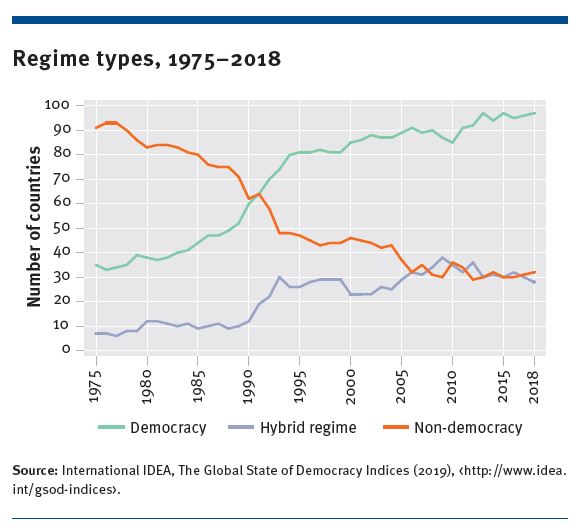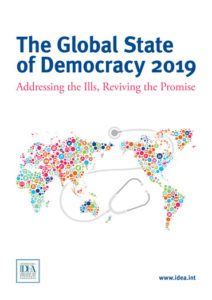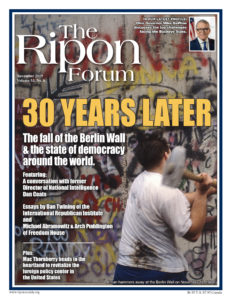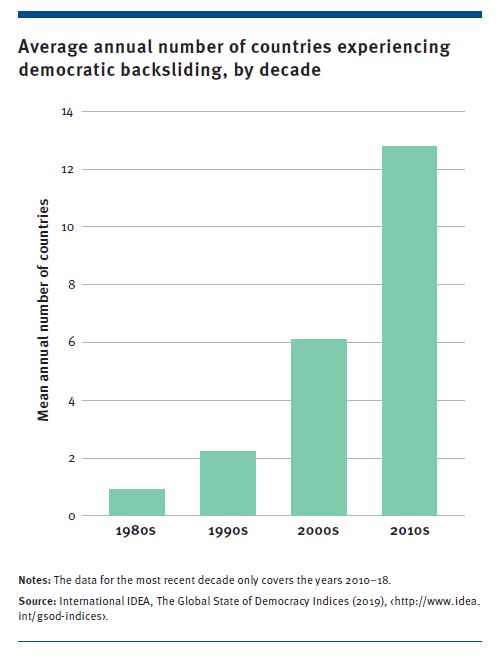 A number of recent reports paint a grim picture for the future of global democracy. According to watchdog Freedom House, 2018 marked the 13th consecutive year of decline in global freedom. According to the New York Times, since 1994, 75 countries have taken steps toward authoritarianism, notes Nancy Lindborg, president and CEO of the United States Institute of Peace.
A number of recent reports paint a grim picture for the future of global democracy. According to watchdog Freedom House, 2018 marked the 13th consecutive year of decline in global freedom. According to the New York Times, since 1994, 75 countries have taken steps toward authoritarianism, notes Nancy Lindborg, president and CEO of the United States Institute of Peace.
The latest “Global State of Democracy” (GSoD) report from International IDEA notes that while the quantity of democracies continues to increase, the quality of democratic government has been eroding, sometimes to the extent of democratic backslide or even breakdown, adds Marie Becker of Democracy Without Borders.
 “What stands out as particularly worrisome is the observation that modern democratic backsliding is occurring from within the democratic system, at the hands of democratically elected majorities,” she observes. “The primary concern is thus with the non-electoral pillars of democracy such as civic space and checks and balances.”
“What stands out as particularly worrisome is the observation that modern democratic backsliding is occurring from within the democratic system, at the hands of democratically elected majorities,” she observes. “The primary concern is thus with the non-electoral pillars of democracy such as civic space and checks and balances.”
Transformational change?
But it is important not to overlook an important piece of the global landscape, USIP’s Lindborg contends. Though authoritarianism is on the rise, so are the number of people taking to the streets demanding greater freedom, accountability and transparency from their governments. In far-flung locales, from Hong Kong, Kazakhstan, Venezuela and Algeria to Poland and Sudan, citizens have used nonviolent action to push back against corruption, cronyism, rigid laws and to overthrow ossified autocrats, she tells the Halifax International Security Forum.
“Together, these movements tell a different and deeply encouraging story of a democratic resurgence that probably won’t be driven by partner nations, heads of state or U.S. leadership,” she adds. ” Instead, it will come from the people themselves, who have imbibed the powerful ideas and values of democracy and are demanding that vision for themselves. Remarkably, and against great odds, some of these movements are creating transformational change.”
Contrasting a foreign policy that promotes the American example to a policy that promotes America first presents a false choice, argues former Director of National Intelligence Dan Coats.
 “I believe this is something of a false dichotomy,” he tells the Ripon Forum. “The old ‘America First’ once attached to pre-war isolationism has led many to misinterpret the concept now relevant to the modern world. Isolationism was rejected back then as an irresponsible dream. Since then, American foreign policy has always been centered on American national interests, but as properly defined and accurately understood.”
“I believe this is something of a false dichotomy,” he tells the Ripon Forum. “The old ‘America First’ once attached to pre-war isolationism has led many to misinterpret the concept now relevant to the modern world. Isolationism was rejected back then as an irresponsible dream. Since then, American foreign policy has always been centered on American national interests, but as properly defined and accurately understood.”
“Our core national interests — peace, prosperity, security — have always included nurturing everywhere our core values,” Coats adds. “Extending benefits of freedom, democracy, human rights, and free enterprise to others has always served our national interests. This is the real ‘America First.’”
When President Ronald Reagan delivered his Westminster Address thirty years ago, he invoked the notion of “a battle of ideas, an ideological competition, a competition of systems,” notes Carl Gershman of the National Endowment for Democracy. And a lot of people came to the conclusion after the Cold War that this battle had ended—in other words, that democracy was no longer being contested.
 Now, on the 30th anniversary of these historic events, many people are saying that it wasn’t the end of history, but it took a long time to realize that. The real question now is, does authoritarianism itself represent a coherent competitor to the democratic idea? he asked a recent forum in The American Interest:
Now, on the 30th anniversary of these historic events, many people are saying that it wasn’t the end of history, but it took a long time to realize that. The real question now is, does authoritarianism itself represent a coherent competitor to the democratic idea? he asked a recent forum in The American Interest:
There is a kind of Authoritarian International; they do cooperate with each other in the Shanghai Cooperation Organization and other structures, like the Organization of Islamic Cooperation. And then recently in Sudan, for instance, Russia went in along with the Gulf States and Egypt to try to stop the struggle for democracy. So there is a competition that’s taking place today. It doesn’t have the same coherence, it’s not as bilateral as it was during the Cold War, but it does exist, and we have to realize that. We don’t have that consensus yet.

Freedom House
To counter freedom’s retreat, we must first recognize that modern authoritarianism is not a passing phenomenon. It is a permanent and increasingly powerful rival to liberal democracy as the dominant governing system of the 21st century, note Michael Abramowitz and Arch Puddington, Freedom House president and distinguished fellow for democracy studies, respectively.
Today autocracies are led by figures who are strategic, patient, confident, and determined to retain power indefinitely. Variations on the systems that have proved effective in suppressing political dissent and pluralism in Russia and China are less likely to collapse than traditional authoritarian states, given their flexibility and pragmatism, they write for the Ripon Forum:
The argument, frequently invoked by some political leaders, that the United States can no longer be the world’s policeman is dishonest and misleading, creating a false choice between military overreach and shameful indifference to the freedom of others. America has successfully promoted democracy through shrewd diplomacy, nonmilitary forms of aid and pressure, and its own example as a just and welcoming society. All of this rests on the strength of our system of government.
 The old debates pitting interests against values in American foreign policy fall away in a new era when revisionist authoritarian powers are using sharp power instruments to subvert and weaken democracy in order to build out spheres of influence hostile to American interests, argues Daniel Twining, President of the International Republican Institute.
The old debates pitting interests against values in American foreign policy fall away in a new era when revisionist authoritarian powers are using sharp power instruments to subvert and weaken democracy in order to build out spheres of influence hostile to American interests, argues Daniel Twining, President of the International Republican Institute.
Authoritarians in Beijing and Moscow believe disrupting the democracies – through various combinations of disinformation, misinformation, united-front tactics, corruption, and subversion – is central to their goal of separating America from its allies and undermining the capacity of the United States to project power and influence globally. If our great power competitors understand the contest underway as an ideological one pitting free societies against authoritarian state capitalists, why would we in the United States shy away from describing the challenge in similar terms? he asked the Ripon Forum.
 As the National Endowment for Democracy’s report on authoritarian “sharp power” explains,
As the National Endowment for Democracy’s report on authoritarian “sharp power” explains,
Over the past decade, China and Russia have spent billions of dollars to shape public opinion and perceptions around the world. This foreign authoritarian influence is not principally about attraction or persuasion; instead, it centers on distraction and manipulation. These ambitious authoritarian regimes, which systematically suppress political pluralism and free expression at home, are increasingly seeking to apply similar principles internationally to secure their interests. RTWT








